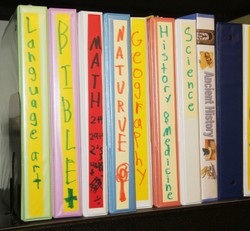Lots of homeschool families rely on narration as an instructional strategy. It is simple and requires no extra materials to implement. You simply have your child retell what he just read or heard in his lesson. Although narration is simple, it can have trouble spots such as the problem here.

Narration Problems: The Narration Includes Extra Information
by Jimmie
When my child narrates a reading passage, he adds his own thoughts, imaginations, or even facts he learned elsewhere. Is this a problem?
Dealing With Extraneous Details in Narration
Question:
My child can narrate, but when she does she adds in details she did not read in her text. These facts are true; they come from television documentaries, other books, or real life experiences. But they were not in the reading assignment I asked her to narrate. Is this a problem?
Answer:
Strictly speaking, a narration is telling back. So extra details don't belong in a strict narration.
If the narration is mostly facts outside of the reading assignment, there is a problem. Why did the reading assignment not get narrated? Was it a lack of attention? Was it a lack of understanding? The reading assignment itself should be narrated.
If the narration includes a retelling of the material but also adds in other facts, this is a much easier problem to deal with.
Although a strict narration includes only a retelling, we want our children to make connections to prior learning and even to draw their own conclusions based on what they read. So it would be a shame to discourage such thinking processes.
Instead, help your child identify where the strict narration ends and her own details begin.
Verbal Narrations
If the narration is verbal, it is easy enough to add some qualifiers such as
- "This wasn't in the reading, but I remember that..."
- "The book left out ...."
- "I remember from our trip last year that..."
Remind your child that after he has narrated his reading assignment, he is welcome to continue sharing extra tidbits he remembers from other sources and to express his own thoughts on the topic of study. You certainly don't want to shut down a thinking child!
Written Narrations
In a written narration, it is generally okay to add extra information as long as it is all accurate. The written narration becomes a report that is based on many sources of information, one of which was the day's reading assignment.
Narration Problems
What is your most common one?
More Narration Links
Narration Helps
This page is devoted to narration -- what it is, questions to ask to begin narrations, creative narration ideas, narration reminders, and more.
Timelines for Narration
Timelines make a great format for structuring your narrations.
Reading Comprehension Workbooks
for practice in selecting main ideas and distinguishing fact and opinion
 |  |  |
| Differentiated Activities for Teachin... Scholastic Teaching Resources (Teaching | Week-by-Week Homework for Building Re... Scholastic Teaching Resources (Teaching Only $30.0 | Fact & Opinion (Reading Passages That... Teaching Resources |
More Narration Problems And Tips for Solving Them
All the Articles in This Series
You might also like
What is Notebooking?Notebooking is a simple but flexible instructional method which many homescho...
Road Tape for Toy CarsConstruct a road for your Matchbox Toy Cars using Road Tape! Not only fun but...








 Unique Uses for an Over the Door Shoe Organizeron 01/27/2012
Unique Uses for an Over the Door Shoe Organizeron 01/27/2012
 How to Get Pinned at Pintereston 01/27/2012
How to Get Pinned at Pintereston 01/27/2012
 Top Five Field Trip Destinations in Memphis, Tennesseeon 01/26/2012
Top Five Field Trip Destinations in Memphis, Tennesseeon 01/26/2012
 Maya Angelou Poet Studyon 01/22/2012
Maya Angelou Poet Studyon 01/22/2012


Comments
An interesting teaching method.
Beautifully presented, but my Mother whilst doing correspondence before going to Junior school, was no great shakes as a teacher. Her Irish temper prevented her from having the patience for it. So I take my hat off to mothers who can home-school their children.